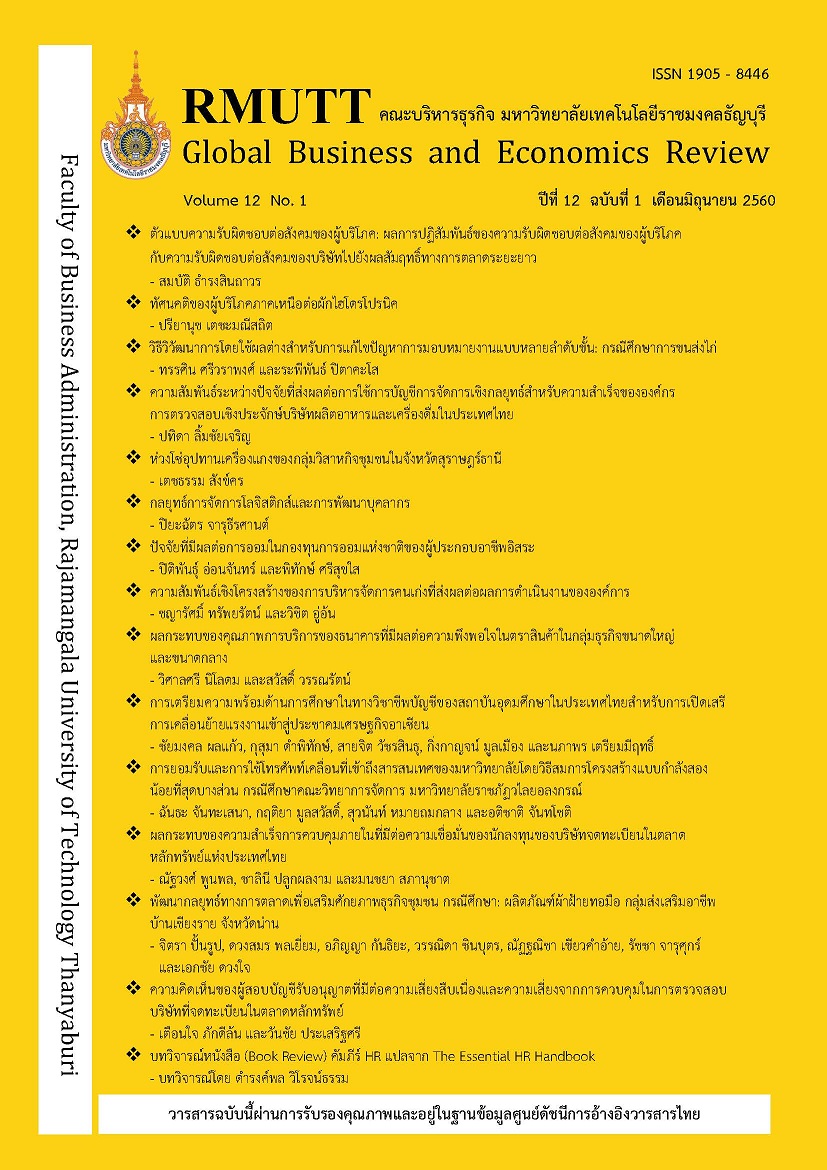THE PROFESSIONAL ACCOUNTING EDUCATION PROVISION OF HIGHER EDUCATION INSTITUTIONS IN THAILAND FOR FREE MOBILITY OF EDUCATED LABOUR IN ACCOUNTANCY SERVICES SUPPORTING TO ASEAN COMMUNITY
Keywords:
Readiness, Free Mobility of Educated Labor, AECAbstract
This research aims to investigate the operating mechanism of Thai public and private universities for preparing students to compete in ASEAN Economic Community (AEC). Significant problems in the development of competitive advantages for Thai accountants are included in this research. An in-depth interview was used for data collecting by deans or heads of accounting department of 30 universities in the middle region of Thailand. Research findings present significant operating mechanism that Thai universities used to prepare students for AEC. The mechanism consists of 1) the development of cooperative among universities, budgeting allocation for the development of academics and learning facilities; 2) the development of accounting curriculum based on Thai Qualifications Framework for Higher Education, International Education Standards, Internship/Co-operative Education, and Accounting Accreditation; 3) the development of teaching and learning methods by including a variety of teaching techniques, English and ASEAN language, and professional ethics; 4) organizing extra-curriculum activities; 5) establishing co-operative with business entrepreneurs for the development of accounting profession for students. Significant problems in preparing Thai students to compete in AEC are communications and technology skills. Understanding the operating mechanism and problems in preparing students to AEC would be an important guideline for universities to improve their teaching and learning systems for future competitive advantage.
References
วลัยลักษณ์ สุวรรณวลัยกร และ มนวิกา ผดุงสิทธิ์. (2556). ความคาดหวังและความพร้อมของวิชาชีพสอบ บัญชีไทยในการแข่งขันในประชาคมเศรษฐกิจอาเซียน. วารสารวิชาชีพบัญชี, 9(25), 35-49.
ศูนย์บริการวิชาการแห่งจุฬาลงกรณ์มหาวิทยาลัย. (2555). รายงานการศึกษาฉบับสมบูรณ์ โครงการเตรียมการรองรับการเคลื่อนย้ายของแรงงานสู่การเป็นประชาคมอาเซียน. สืบค้นจาก http://research.mol.go.th/2013/rsdat/prg/eachview.php?okey=NGDK0N4
สภาวิชาชีพบัญชีในประบรมราชูปถัมภ์. (2557), FAP Newslatter AEC: ฉบับที่ 1-48. สืบค้นจาก http://www.fap.or.th/index.php?lay=show&ac=article&Id=539692073&Ntype=44
สุบิน ยุระรัช และคณะ. (2554, ธันวาคม). ความพร้อมในการพัฒนาบัณฑิตของสถาบันอุดมศึกษาเอกชนใน ประเทศไทยเพื่อรองรับประชาคมเศรษฐกิจอาเซียน. วารสารวิชาการสมาคมสถาบันอุดมศึกษา เอกชนแห่งประเทศไทย(สสอท.), 17(2), 1-15.
อภิญญา เลื่อนฉวี. (2553). เคลื่อนย้ายแรงงานเสรีในอาเซียน: ผลกระทบอย่างไรต่อไทย. วารสารสถาบันพระปกเกล้า, 8(3), 77-89.
อ้อทิพย์ ราษฎร์นิยม และ ชมพูนุท โกสลากร เพิ่มพูนวิวัฒน์. (2552). แนวโน้มตลาดแรงงานไทยในต่างประเทศ. กรุงเทพฯ: กรมการจัดหางาน กระทรวงแรงงาน.
Annisette, M. (2000). Imperialism and the professions: the education and certification of accountants in Trinidad and Tobago. Accounting, Organizations and Society, 25, 613-659.
Association of Southeast ASIAN Nations. (2012) ASEAN VISION 2020. Retrieved from http://asean.org/?static_post=asean-vision-2020
Biggs, J. (2003). Teaching for quality learning at university (2nd ed.). Buckingham: Open University Press/Society for Research into Higher Education.
Biggs, J, & Tang, C. (2007). Teaching for quality learning at university: what the student does (3rd ed.). Open University Press/Society for Research into Higher Education.
Birkett, W. P., & Even, E. (2005). Control of accounting education within Australian universities and technical colleges 1944-1951: a uni-dimensional consideration of professionalism. Accounting, Business & Financial History, 15(2), 121-143.
Bloom, B. S. (1976). Human characteristic and school learning. New York: McGraw-Hill.
Grigg, D. B. (1977). E. G. Ravenstein and the “Laws of Migration", Journal of Historical Geography, 3(1), 41–54.
Johnson, T. J. (1982). The state and the professions: peculiarities of the British, in Social class and the division of labour: essays in honour of Ilya Neustadt. Cambridge: Cambridge University Press.
Lee, E. S. (1966). A theory of migration. Demography, 3(1), 45-47.
Perera, M. H. B. (1989). Accounting in developing countries: a case for localized uniformity. The British Accounting Review, 21(2), 141-157.
Pholkeo, C. (2013). An examination of the emergence and development of the accountancy profession in developing countries: The case of the Kingdom of Thailand 1948-2010. (Doctoral dissertation, RMIT University, Melbourne, Australia).
West, B.P. (2003). Professionalism and accounting rules. New York: Routledge. Yapa, P. (2000). University-profession partnership in accounting education: the case of Sri Lanka. Accounting Education, 9(3), 297-307.
Downloads
Published
How to Cite
Issue
Section
License
The articles published in this journal are the intellectual property of their respective authors.
The views and opinions expressed in each article are solely those of the individual authors and do not reflect the positions of Rajamangala University of Technology Thanyaburi or any of its faculty members. All components and content of each article are the sole responsibility of the respective authors. In the event of any errors, the authors shall bear full responsibility for their own work.








